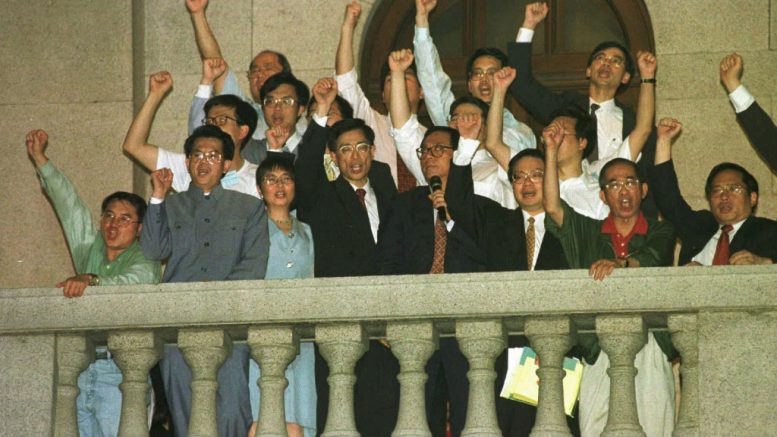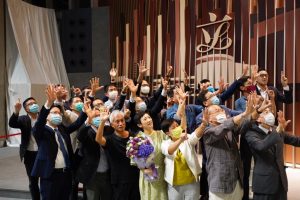By Chris Yeung —
Days before China’s top legislature, or National People’s Congress, was scheduled to rubber-stamp a set of amendments to Hong Kong’s electoral system in March, a key local adviser to the communist authorities caused a stir when he warned of an overkill of the overhaul.
Shiu Sin-por, former head of the now-disbanded Central Policy Unit under the Leung Chun-ying administration, spoke at a closed door session chaired by Xia Baolong, Beijing’s official in charge of Hong Kong affairs, in Shenzhen.
He said the pro-democracy force has already become crippled after the national security law took effect in July last year, followed by a series of “actions,” with democrats being jailed, having fled and quit politics.
Democrats, Shiu has reckoned, could no longer pose strong resistance against the authorities. He urged the central authorities not to “overkill” when revamping the electoral systems.
Dubbed as an ultra-leftist, Shiu’s frank note on the fragility of the democrats has failed to prompt the authorities to see the merits of proportionality and restraint in dealing with the political dissent. Details of the electoral overhaul that came to light thereafter show Beijing has done the opposite.
If anything, the electoral revamp has emerged as an ugly piece of political manipulation dressed up as an “improvement” aimed to bar anyone whom Beijing does not like to stand for election.
It has already scored early success in further cooling the already-dampened enthusiasm of the democrats.
There are growing signs of a likely de facto boycott of the pro-democracy camp in fielding candidates to contest the next Legislative Council election scheduled for December.
On the face of it, the Democratic Party, which is the major force in the pro-democracy camp, is still undecided until after the Election Committee subsector election is held in September.
With views about whether or not they should run for election sharply divided at a meeting early last month, the Democrats decided to consult their members and supporters more thoroughly.
That could not stop former Democratic Party chairwoman Emily Lau Wai-hing from giving early calls for members not to run. She said members should not seek nominations from the Election Committee for their candidacy at a price of their dignity.
Though described by another former party chief Lee Wing-tat as “just one member’s views,” Lau’s no-nonsense plea has resonated with a good audience in the pro-democracy camp.
The voice of “leavers” has become more dominant. Those of the “stayers” have been noticeably weak. Taken together, they have given a clear picture of the views of the pro-democracy supporters.
To put it mildly, the majority of democrats are not keen to see their representatives joining the fray. Doing so could give legitimacy to an unjust and undemocratic game. They want citizens to shun the polls as a vote of protest – and defiance.
The inclination of the democrats not to contest the Legco election has also been manifested in remarks made by Fung Wai-wah, president of the Professional Teachers Union on Sunday.
Fung said it is extremely unlikely that they will contest the Election Committee election. The possibility of them bidding for the Legco education functional constituency seat, he said, is also remote.
The union, which is the largest teachers’ union, is one of the major bodies in the pro-democracy camp. Their stance on election is certain to have an important impact on the view of the whole pro-democracy camp.
Amidst more signs of the democrats shunning the polls, Beijing seems to have understood better what Shiu was alluding to when he warned of an overkill of the electoral overhaul.
A former Democrat legislator Fred Li Wah-ming said in an interview at the weekend he received a clear message from the central authorities through middle men Beijing hoped that the Democrats would run for the Legco polls. Li said Beijing has also given their views on who among the Democrats would be acceptable to Beijing.
There is no reason to question the credibility of Li’s remarks. That Beijing is desperately keen to relay through Li a message to the Democrats for them not to boycott the election shows their belated awareness of the danger of an overkill.
Under the election overhaul, there is no doubt the next Legco will be under the control of patriots in accordance with its original design. Still, Beijing wants a symbolic but unharmful presence of the dissenting voices in the legislature to showcase a democratic model with Hong Kong characteristics.
Beijing should now come to realise they just cannot have the best of both worlds, winning an unreal election while deceiving everyone it is a real contest.
This article was first published on Apple Daily website on May 12.



Be the first to comment on "An election overkill kills democrats’ desire for seats"